Peter MALONE
Saturday, 18 September 2021 19:58
Laggies
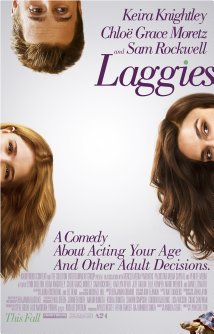
LAGGIES
US, 2014, 99 minutes, Colour.
Keira Knightly, Chloe Grace Moretz, Sam Rockwell, Mark Webber, Sarah Coates, Ellie Kemper: Gretchen Moll.
Directed by Lynn Shelton.
Laggies is a colloquial word to describe young women and their trying to break out.
The film is a surprising star vehicle for Keira Knightley after her previous successes but she enters into the spirit of this film as Megan, nearing 30, unsettled though in a relationship with her high school sweetheart, Anthony (Mark Webber), holding up a sign in the street to advertise her father’s legal firm, promising to go to seminars but not doing it. She belongs to a group of women whose teenage boundary breaking we see during the prologue but who are now settling down, especially for marriage and children, some of them rather more prim in their behaviour. Megan feels she is not fitting in, especially when she sees her father and sexual misconduct at her friend’s wedding.
The gist of the film is her encounter with the young teenager, Anika (Chloe Grace Marantz) whose father is a divorce lawyer (Sam Rockwell) and her mother, who has walked out on them seven years earlier, is a model for lingerie catalogues (Gretchen Moll). The father thinks that the relationship is odd but the young girl relies on the old woman for advice, to go to see the school counselor posing as her mother, in a visit to her actual mother.
There is a climax when one of the teenagers crashes the car during an argument and has been drinking, Megan confessing to the police that she was driving, bringing to a head her relationship with the girl’s father, being more understanding of her father and having a good talk with him, and deciding to accept who she really is, no matter what the consequences.
The film was directed by independent director, Lynn Shelton (Humpday, Sisters Sister).
1. A story about women? About teenage girls? About early recklessness? About settling down? About deciding futures and planning for them?
2. The Seattle setting, the city and its views, suburbs and streets, homes, schools and clubs, bars, socials and weddings? The musical score?
3. The title, the description of the young women in the film?
4. The prologue, the style of photography for flashbacks, the girls, their characters, behaviour, jokes, upsetting the rules, drinking, the nude swim…?
5. 10 years later, the group, keeping together? The women friends? Anthony and Matt? Their gatherings, preparation for the wedding, the girls together, the new restaurant, Alison as prim, criticising Megan and Buddha’ nipples, the jokes and the touch of the raunchy, Alison upset? The other members of the group, their friendship? Savannah and her engagement, pregnancy, asking Megan and Anthony to be godparents?
6. Megan, idle, remembering the past, some ambitions about counselling, standing in the street with the ad for her father, her visits to her family, her father spoiling her? Love for Anthony, their being together for a long time, school sweethearts, his wanting to propose, her hesitation? With the girls, their criticism of her? At the wedding, seeing her father and his sexual behaviour, her shock, running away?
7. Anthony, the good man, in love with Megan, at home, urging her to the seminar, to make decisions, his own development (and the animal choice), at the wedding, his wanting to propose, Megan leaving, her later explanation, her consent, his giving her the ring, the plan to elope?
8. Megan, upset by her father, leaving the wedding, absent from the photos, encountering Anika and the group, agreeing to buy the alcohol? The skateboard? Their inviting Megan to come with them, the discussions? Megan pretending to be at the seminar, going home with Anika, the room, the father and his questions? Her response? The strange situation with his daughter? Her spinning a story about new accommodation, his allowing her to stay? In the guest room?
9. Anika’s father, divorce lawyer, the young man and his father’s divorce? His own divorce, the wife walking out, trying to bring up his daughter? Lonely? An eccentric sense of humour? Edge with his daughter?
10. Anika phoning Megan with the special phone, asking her to be her mother at the parents’ meeting, the discussions with the counsellor, planning the future? Staying over, and Anika asking her to go to see her mother with her? The visit, the mother, having walked out, conscious that she had done wrong, unable to talk to her daughter, Megan giving her good advice, serving the lemonade, bringing in the lingerie that she used for her photo shoots, Anika choosing, happy with the visit?
11. Anthony, the phone calls, her anger with her father? The drinking with Craig, the kiss, the sexual encounter, the aftermath? Anika’s seeing the two together? Her rationalising the situation?
12. Driving, Patrick drunk, the arguments, the crash, Megan taking the blame, the breath test, in jail, Craig coming to talk with her, her confession of the truth?
13. Megan returning home, the plan to elope, the dress that she bought while shopping with Anika and her friends, at the airport, the discussion with Anthony, the realisation that she could not marry him, the impact on Anthony, her leaving, going to the prom, urging Anika to approach Junior and wanting to be his girlfriend, his acceptance?
14. Megan, her return to Craig, his momentary rejection, her going in – to her future?
Published in Movie Reviews
Published in
Movie Reviews
Tagged under
Saturday, 18 September 2021 19:58
Black Sunday/La maschera del demonio
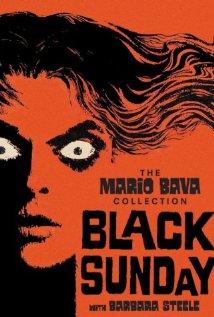
BLACK SUNDAY/ LA MASCHERA DEL DEMONIO
Italy, 1960, 87 minutes, Black and white.
Barbara Steel, John Richardson, Andrea Checchi, Ivo Garrani.
Directed by Mario Bava.
Black Sunday was the first feature film of cinematographer, Mario Bava, who also worked on special cinematic effects. With this film, now considered a classic, influenced by Hammer Studios’ Dracula of 1958, Bava began a career with mixed success, some ‘gialli’ thrillers which influenced Dario Argento and others, some exploitation films, and some work with his son, Lamberto.
British actress Barbara Steele was introduced in this film and had some success in a career in horror films. British John Richardson, who had appeared with Raquel Welch in 1,000,000 Years BC, continued especially in Italian films.
The film takes up the vampire themes, working some variations, the Inquisition in the 17th century and an age of reason confronting vampires in the 19th century.
1. The classic status at this film? In Italian Cinema? In the horror genre? Its influence on other directors? The work of Mario Bava, cinematographer, artist, director?
2. The quality of the black and white photography, shading, contrasts? The visual compositions? The action within the frame? Special effects? The musical score?
3. The title, the focus on the mask of the Demon? The prologue, the witch, her condemnation, the denunciation, the Inquisition and its authorities, the witch and her servant? The burning at the stake? The mask and its imposition?
4. The narrative, the voice-over of the Doctor?
5. Two centuries later, the post Napoleonic era? The two doctors travelling to the conference? In the coach, the intellectual discussion, scientists? The short cut through the forest, the doctor giving the coachman extra money, his fears, ghosts, the wheel coming off the carriage, the repairs?
6. The two doctors exploring, going into the crypt, finding the witch, the mask? The eerie atmosphere? The doctor cutting his hand, the blood going onto the corpse of the witch, her gradually reviving?
7. The castle, the Prince, the portrait of his ancestor? His children, the daughter and her resemblance to the witch? Their way of life? The effect? The fears? The revival of the witch, of the servant, his approaching the Prince, the attack, the prince dying, revealing some of the truth?
8. Brother and sister, the servants, their concern, sending Boris for the doctor, his later death and disfigurement? The doctor arriving, his being taken over and possessed, his blood drained? The death of the Prince?
9. The maid, going to the dairy, her being a witness giving testimony?
10. The young doctor, his infatuation with the daughter, his return to the castle, the strange encounter with the doctor, his wanting to protect the daughter?
11. In the crypt, the brother and his being pursued, falling down the hole, his dying? The daughter, the witch taking over her body? The young doctor, his pursuit, the confrontation, the death of the servant?
12. The young doctor and the priest, the documents, finding the formulas, preparation for the burial, the priest and his concern, knowledge?
13. The end, the death of the daughter, the death of the witch, the daughter reviving – and happy ending?
14. Classic elements of a vampire film with Mario Bava’s perspective?
Published in Movie Reviews
Published in
Movie Reviews
Tagged under
Saturday, 18 September 2021 19:58
Tanna
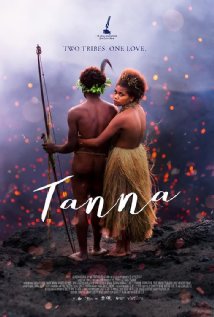
TANNA
Vanuatu, Australia, 2015, 100 minutes, Colour.
Directed by Martin Butler, Bentley Dean.
This is a story from Vanuatu, a story from the Yakel tribe, set in 1987, a story of a doomed romance.
The film is a co-production between Vanauatu and Australia, people of the island performing, Australians writing and directing after their experience in being with the tribes people.
Many audiences will be thinking of Romeo and Juliet as they watch this film, star-crossed lovers.
The film opens with a focus on two young girls, Selin, a sprightly young girl and her sister Wawa who is at the verge of her initiation into adulthood and, therefore, an arranged marriage. However, she is in love with another member of the tribe, a Hunter, Dain, who has been away from the tribe but has now returned. The couple elope, going away from the tribe to the rim of an active volcano in the centre of their island. Selin follows them and they declare that they will not return.
This leads to a state of warfare between the two tribes, Wawa having been promised to a man from a neighbouring tribe, continually antagonistic towards Yakel.
Following the Romeo and Juliet lead, the young couple are found dead, which leads to a cessation of hostilities, grief for those who have died, a challenge to the traditions of arranged marriages – with a final songs celebrating this transition to greater freedom for love amongst the people.
The Yakel tribe are proud that they have their customs, that they have resisted colonialism, that they have resisted Christianity, that they have resisted the lure of money, that they have kept to their old customs.
Actors and others involved in the film had not seen a film before this production and travelled overseas to be feted at the Venice film Festival, an extraordinary change of life that they had been used to. There is simplicity about the performances, and authentic feel about the people, and some spectacular photography, which means that a wide audience will enjoy the story, its romance and tragedy.
1. A film from Vanuatu? The island, the Yakel tribe, the terrain, the coast, the beaches, the village, forests, the volcano? Authentic atmosphere?
2. The acclaim for the film, overseas festivals?
3. An Australian production, working in Vanuatu, the particular perspectives and interpretation of the islanders, the history, customs?
4. The story of 1987? The colonial past of Vanuatu? The custom of arranged marriages, the challenge to this custom?
5. The islanders, resisting colonialism, relisting resisting Christianity, the lure of money? Customs? The opening and closing? The song about the chiefs, the arranged marriages, the need to change?
6. Traditions, the tribe, the role of men, presence of women, children? Of the tribes and hostilities? The role of the Chief? The role of the Shaman? Authorities?
7. The opening introduction to the family, Selin and Wawa, children, sisters, their parents, play and work? Selin, child, her energy, playing, the touch of mischief? Wawa? Work? Seeing Dain, following him, away from the group, his return to the tribe, love?
8. Wawa, her age, at the initiation ceremonies, with the women, at the pool, the return to the village, the arranged marriage?
9. Dain, his life, hunting, the love for Wawa, his return, the influence of his grandfather, obeying orders, courting Wawa? Love and intimacy?
10. The arranged marriage, the people from the other tribe, the ritual of agreement, Wawa and Dain running away? Going to the volcano? Their time together?
11. The volcano, the rim, the interiors, the lava? The couple at the volcano, Seiln following? The reaction of the tribe, the couple saying they would not return?
12. The decision, the tribes, enmity? The views of the warriors approaching? The couple, their love, the background of the poisonous mushrooms, eating them, their death?
13. Grief, the Shaman and his song, love, change in the customs?
14. Audiences thinking of Romeo and Juliet, the lovers, their age, deaths, their being carried down the mountain, the funeral, the grief, everybody gathering,
the song, and the change in the customs?
15. A dramatic reflection on traditions, customs, change, and personalising them?
Published in Movie Reviews
Published in
Movie Reviews
Tagged under
Saturday, 18 September 2021 19:58
Absolutely Anything
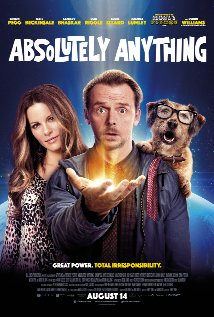
ABSOLUTELY ANYTHING
UK, 2015, 85 minutes, Colour.
Simon Pegg, Kate Beckinsale, Rob Riggle, Eddie Izzard, Joanna Lumley, Robert Bathurst, Sanjeev Bhasker, Meera Syal.
Voices of: Robin Williams, John Cleese, Terry Gilliam, Eric Idle, Michael Pailin, Terry Jones.
Directed by Terry Jones.
The Monte Python Flying Circus was extraordinarily popular in the 1970s and the 1980s, with their television series as well as films like Jabberwocky, The Life of Brian, The Meaning of Life. They were always very talented with short sketches, and their films really included a succession of sketches. This is the case with Absolutely Anything, based on the script by Terry Jones but not produced when he wrote it, now resurrected and the opportunity for some Python humour as well as the reuniting of the team to provide eccentric voices.
Audiences stumbling into the film and not aware of Python humour may be puzzled. The fans may not think it is one of the greatest but, nevertheless, there is quite some enjoyment.
The basic plot is one of those “what-if?” stories where a character is given unlimited powers to effect anything they desire. All they have to do is formulate their wish and wave their hand – and there it is. The character who receives this power is Neil (Simon Pegg), a high school teacher (with an impossibly unruly class and a head teacher who puts down) who lives by himself, is infatuated by the television producer upstairs, Catherine (Kate Beckinsale), who quite likes him but… nothing special.
In the meantime we go into the realm of Terry Gilliam animation, into a world beyond the stars, to be introduced by some rather farcical hideous-looking characters, an interplanetary Council who have the power to test out a human to see whether they want Earth or not. And the joke is that these ugly looking creatures, who mistakenly all have girls names, are voiced by the Python team. The President of the Council is, needless to say, John Cleese with his dominating and vigorous voice. Eric Idle pops up now and then as does Terry Jones – though not always easy to pick Michael Pailin.
We go into space now and again but most of the action focuses on Neil who is a hapless individual but rather enjoys having the power to achieve anything he wishes. Like Dudley Moore in Bedazzled, granted many wishes, he makes some inept choices, especially when he wants a better image and sexual prowess for himself. But, by and large, there are some amusing variations on the wish-fulfilment thing, getting rid of his class by an explosion but able to restore them so that they all are absolutely delighted when they have to read a whole chapter of Dickens quietly.
There is also his friend Ray, Sanjeev Bhaskar, who has an infatuation with one of the teachers – but is alarmed when Neil wishes her to worship Ray and she starts a sect, with touches of the Hari Krishna. There is also the American Grant, Rob Riggle, who is absolutely obsessed with Catherine, making life a misery, but tricking Neil into giving him the powers with, of course, dastardly results.
But, there in the foreground is Neil’s pet dog, Dennis. He is voiced by Robin Williams in one of his last roles, always amusing, a touch of the frenetic as well as sardonic quips – although it is Dennis who is wise enough to think out a solution to the whole problem.
While the film does not give its audience anything it absolutely wants, it does give 90 minutes or so amusement.
1. Monty Python humour, 20th century, into the 21st century? Terry Jones, script and direction? The Pythons and episodic programmes? See, absurd, cosmic, the meaning of life? What if… And consequences? The overview of the cosmic journey?
2. Teamwork, animation, the voices, the style, into nations…?
3. The title, power, wishes, stakes, consequences, self-focused, wishes for others?
4. The cosmic council, angry at the world, testing all the planets and pupils (God-image, Evil-image)? The meetings, the appearances, the voices, their language, into English with Python accents, girls’ names and their not realising this? The hierarchy in Council, interchanges, the decision about Earth, the choice of Neil, testing him, the surveillance, their interpretations of his behaviour, the decision for destruction, the humour of the phone numbers one, two, three, and then finally briefer?
5. Neil his dream, Catherine making the award, the discussions, affirmation, the dogs coming in, the dogs upsetting everything, his waking up? Ordinary citizen, his unit, his friendship with Dennis? Going to school, his bike and its being smashed – by Terry Jones as the driver? Teaching, and his unruly class? The Head and his insults? Ray and his friendship, wanting to be the dream man of the aloof teacher? Their meals, discussions? The teacher and her obsession, her followers and pedestalising Ray and the effect on him, trying to escape?
6. Catherine, her work, television, the books, the producer and arrogance, anti-books, the gossip program, attacking authors, the interview with the author and embarrassing him? The producer and his liking for gossip? Her ideas, wanting serious program, the producer hitting on her? Her girlfriend, their outings, discussing their lives? Grant, appearing, his sessions, continued pursuit? Reacting to his wish that she loved him, wanting to have her own life (and her objection to any infringement of freedom)? The drink with her friend, going upstairs to Neil, the approach, his thinking it was his will and the reality, in the morning and coming back? Hearing Dennis as police, presuming that Neill was gay? Being pursued by Grant, finding the truth with Neil, going to his room, his good wishes, the wish and Catherine forced to love Grant? Her being freed? The end and her choice to be with Neil?
7. The wishes, the class to disappear and the explosion? Reversing this? Dennis and the turds walking away? The whiskey going back into the bottle? The bottle hopping on the streets, smashing the window, the police, the disappearance? Restoring the children? Ray and his wanting the teacher to admire him? Neil, in the mirror, his false wishes, penis, body, macho?
8. Dennis, the dog, Robin Williams’ vice? Barking, chatting, getting excited about the doorbell, referring to Catherine as a bitch, his liking biscuits, saying dogs did not want their stomachs tickled? The threats to his life from Grant? The transformation, Grant turned into a corgi – and the two dogs together? Dennis, his wisdom, the best wish, the destruction of the source of the wishes?
9. The nice wishes, the class quiet and studious, wanting to read the whole chapter Dickens, the principal and his being genial?
10. Grant, American, military, obsessed, continually turning up, his antics, with Catherine and her rejection, with Neil, the dog? Adapting, making Neil grant his every wish, money, power, Neil and his fears, dressed as a woman? Catherine arriving, made to love Grant? The change and Dennis’ help?
11. Dennis, power, the good wishes the end?
Published in Movie Reviews
Published in
Movie Reviews
Tagged under
Saturday, 18 September 2021 19:58
Hunger Games, The: Mockingjay Part Two
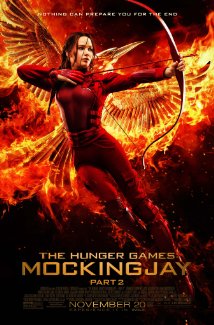
THE HUNGER GAMES: MOCKINGJAY PART 2
US, 2015, 137 minutes, Colour.
Jennifer Lawrence, Josh Hutchison, Liam Hemsworth, Woody Harrelson, Donald Sutherland, Philip Seymour Hoffman, Julianne Moore, Willow Shields, Sam Claflin, Elizabeth Banks, Mahershalaher Ali, Jena Malone, Jeffrey Wright, Natalie Dormer, Elden Henson, Wes Chatham, Sarita Chowdhury, Patina Miller, Michelle Forbes, Rob Knepper.
Directed by Francis Lawrence.
Three years ago, audiences who had not read the series of books, The Hunger Games, by Suzanne Collins, were introduced to strong heroin, Katniss Everdene. She lived in an oppressed sector of the dictatorship and became the tribute to the annual futuristic fight-to-the-death games, akin to the gladiatorial combats of ancient Rome, with an effete society, decked out in outlandish costumes, watching or following the breathless television commentary. The president was a tyrant, President Snow.
Then, two years ago, most of us were in the know, watching the developments of Katniss and her friend and survivor, Peeta, and the manipulations of the President and his entourage.
It was last year that we were taken into the rebellion, introduced to a new potential president, President Coin, and the mobilisation of forces to topple President Snow.
And here we are, now, witnessing the uprising, the manipulation of Peeta, the plans of President Coin, the commando raid into the capital and the final confrontations.
Jennifer Lawrence quickly established herself in the imagination of filmgoers as Katniss Everdene and then won an Oscar for Best Actress in The Silver Linings Playbook (2012). We cannot imagine anyone else as this strong character and strong leader.
And most of the cast have continued throughout the film including Josh Hutchison as Peeta, Liam Hemsworth as Gail, Donald Sutherland as President Snow, Woody Harrelson as the adviser, Haymitch, and Elizabeth Banks as the fashion adviser, Effie Trinket. Julianne Moore had been introduced as President Coin as had Philip Seymour Hoffman has adviser, Plutarch. They both continue their roles with Philip Seymour Hoffman having filmed a number of scenes before his untimely death.
So, what is there to say about this final chapter of the saga? The characters continue, although there are complications with the mind-influencing of Peeta, the greater prominence of Gail and his relationship with Katniss and his involvement in the revolt, ambiguities about the role of President Coin, the buildup to the confrontation with President Snow, a long and special effects filled commando sequence as the rebels enter the capital, go through sewers and underground and seem to lose.
The battle sequences are strongly filmed and a certain amount of savagery in the resolution of hostilities – but, not quite what we anticipated, the series comes to an end in an atmosphere of peace and domestic hope.
1. The popularity of the books? And the four films? This finale?
2. The dystopian future? The fascist state? Elites? The poor in subservience? The idea of the games, the celebration of victory? The move towards revolution? Final peace and hope?
3. The parallel with ancient Rome, supremacy, elites, cruelty and the games? The inevitable fall of the arrogant ruler? Revolution and peace?
4. The settings, District 2, District 13, the city itself as the capital, the outskirts, the centre, the buildings? The sets? The musical score?
5. Costumes and decor, for the rebels and the military, for the scientists and the military hardware, the President and the rich, the elite, the raiders?
6. The title, the focus on Katniss, her becoming the symbol, Mockingjay?
7. Dissenter background, District 12, her role in the games, success and survival, with Peeta? President Snow and his using her? The move towards rebellion, going into action, the role of the media, filming action, relaying it on television screens? Her suffering? The relationship with President Coin? With Plutarch? The decision to be a leader, to execute the President, her being used by Coin? But a symbol, in the commando raid, the ultimate execution?
8. Katniss as a person, her age, giving herself to the games instead of Primrose, love for Gale, the past, sharing the experiences with Peeta? Her family? Her skill as an archer? Her relationships? Her friends, her enemies? Snow as an antagonist? The importance of the friendship with Haymitch, with Effie, her costumes and fussing? Plutarch and his support of her? His plan? The raid, the final talk with President Snow, to be executed? President Coin and her final speech, Katniss firing the arrow? The shared experiences with Peeta, his being brainwashed, his action against her, the final kiss, reconciliation, Gale and his siding with Coin, the final domestic scenes with Peeta and the children?
9. Peeta, his past, the baker, attraction to Katniss, participating in the games, surviving, being an ally for Katniss? His being taken, taken over, the effect, his stances against against Katniss, in the hospital, the visit Prim, Katniss and her visit and his outburst? His being cuffed? Recuperating, with the group, his memories? Checking what was real or unreal? Joining the commando raid, experiencing the dangers? His final presence at the council meeting, the vote for new games? His voting no? Love for Katness, with the children and his delight?
10. Gale, in the past, hunting with Katniss, protecting the family, becoming a warrior, love for her, his going into action? With President Coin? On the raid, experiencing the dangers? Not visiting Katniss in hospital, his observing her kiss with Peeta? His becoming an ally of President Coin?
11. President Snow, his rule, his lifestyle and luxury, the council and his cruelty, the Roundtable, killing the General? His appearances on television? His assistant? The nature of the broadcasts, confident in victory, the surprise of Katniss surviving? His decisions about the people, the suburbs, coming into the city, the final confrontation with Katniss, standing at the execution post, the crowds coming and savaging him?
12. President Coin, the rebels, her speeches, military, strategies, with Plutarch, the encounters with Katniss, her using her, her TV speeches, the political aims, winning, heading the council, the discussion about new games and executions, her winning the vote? Her coming to make the speech – and Katniss shooting her?
13. Plutarch, with President Snow, organiser of the Games, his succeeding, being with President Coin, his continued advice, watching? The final success of his plan?
14. Johanna Mason, her role, appearance, rivalry with Katniss, sneering – but, at the celebration, helping her?
15. Finnick Odair, his role as a warrior, the marriage, his wife, the celebration? His participation in the raid, his death? His wife in the aftermath?
16. Boggs, his leadership, loyalty to Katniss? Lieutenant Jackson, joining the rebellion, with Boggs, Boggs and his death, his passing the leadership and the instruments to Katniss? Jackson and her finally agreeing, her death?
17. Commander Paylor, her role with the rebels, her speeches? Vanquishing at the end? Her being voted the new leader?
18. The brothers, helping, one mute, the idea of going underground, the leadership, survival in the sewers, in the railway station, death?
19. Tigress, the story, her appearance, her help?
20. Caesar Flickerman, his role on television, his speech in celebrating the downfall of Katniss?
21. Haymitch and Effie, their roles in the past, continuing to help, Haymitch and his observing, his advice, the final vote against the new Games? Effie, fussing, costumes, make up, the farewell?
22. The commando raid, the preparations, the detail, getting in, the outskirts, the maps, the range of pods and explosions, the tar flood, devastating? The fights, the deaths? Trapped, watching the television broadcasts? Going underground, with Tigress and her help? The eruption of the floor of the underground? Katniss and Gale going in disguise, the people thronging into the city, the children? The parachute, the bombs and destruction? The malice of Snow? Katniss, the explosion, burnt, the being saved, Primrose’s death, her mother looking after her?
23. The finale – not a bombastic and triumphal ending but rather domestic and quiet?
Published in Movie Reviews
Published in
Movie Reviews
Tagged under
Saturday, 18 September 2021 19:58
By the Sea
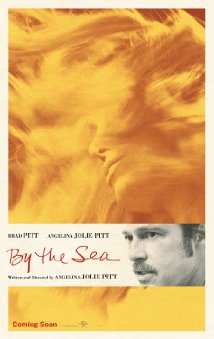
BY THE SEA
US, 2015, 122 minutes, Colour.
Brad Pitt, Angelina Jolie Pitt, Melanie Laurent, Nils Arestrup, Melvil Poupaud, Richard Bohringer.
Directed by Angelina Jolie Pitt.
One of the experiences while watching this film is to find a word that would pinpoint its impact. One of the word choices was “languid” or, to be more precise, “very languid”, or “tres, tres, the languid”. It is one of those films judged by those who are addicted to action pace: “slow”.
The film is set in France, although it was filmed in Malta, standing in for France – beautiful countryside, the roads, the mountains, the bay, the sea, the cliffs, the village and the villa… At the opening, audiences introduced to the central couple, Vanessa and Roland, driving through this beautiful scenery, going to the luxury villa, settling into their apartment. But, all is not well. Roland gets out his typewriter, tries to write but has a writer’s block. Vanessa seems particularly listless.
Over two hours, we share the experience with the couple, something of a novella prolonged into the two-hour film.
Days go by, she staying at home, reading a book she doesn’t like, doing some sunbaking, wearing her wide-brimmed hat, sometimes going for a walk, and not particularly responsive when Roland comes home each evening. He spends his time in the bar, trying to write, still blocked. He drinks.
There are two agreeable characters at the bar, Michel the manager, Nils Arestrup, whose wife is dead, whose memory he cherishes, who listens to Roland, and tries to give him advice, especially about his drinking. And there is Patrice, the old owner of the bar who sits, watches, eats, plays chess with Michel.
Then a young couple on their honeymoon take the next apartment, Melanie Laurent and Melvil Poupaud. They are friendly – but do not know that there is a peep hole from one apartment to the other, discovered by Vanessa, watching through it a great deal, and with the audience, sharing prurient curiosity. Eventually Roland discovers it and he and his wife share a great deal of gazing at the life of the other couple, especially the more intimate parts of their life, their talk, nudity, the sexual relationship.
And all the time and there are quick edited glimpses of some kind of traumatic experience that Vanessa has had – and which the audience may well suspect almost from the beginning.
Roland is exasperated with his wife, sometimes trying hard to build the lost love, sometimes just giving. And she often gives up as well. They share some experiences with the couple next door, sailing, playing cards, going shopping.
Ultimately, there is some tension leading to a final confrontation and truth-telling, especially Roland speaking bluntly to Vanessa. Whether this is what she needs in her depression could be discussed but, ultimately, there is some effect, even hope.
Speaking of prurient curiosity, this is inevitable with Angelina Jolie and Brad Pitt as the stars, the producers, and Angelina Jolie (several times in the credits referred to as Angelina Jolie Pitt, and even in the final credits as Mrs Jolie Pitt) writing and directing. And the niggling question: does this reflect their real-life relationship? It must be said that Angelina Jolie, quiet voice, listless, depressed, is the exact opposite of Lara Croft and some of her more vigorous characters. So, a drama that probably owes more to French cinema of the 1950s and 60s and to the existential portrait of characters, lost and found, of Italian Michelangelo Antonioni.
Languid as we watch it – but much of it stays in the memory.
1. The work of Angelina Jolie, her career, acting, star, awards, moving into direction? Her relationship with Brad Pitt, work together, life together?
2. Influence of the French Nouvelle Vague, Michelangelo Antonioni? The use of French language? Audiences accepting this – hostility from American audiences? The couple and their lives and reputation? Subtitles?
3. The Maltese locations for France, the bay, the sea, the village, the villa, bars, sailing, the cliffs? The musical score?
4. The title, the experience of Vanessa, Roland, his novel gathering together varied experiences and the characters they met?
5. Audience interest in the characters, American, husband and wife, wealthy, their culture, her background as a dancer, his being a writer, the mystery about their lives and their relationship? The arrival, the scenery, the car, the roads? Settling into the room? She generally remaining at the villa, his going out, the daily returns, the nights?
6. Michel, pleasant, his life, memories of his wife, looking at her photo, listening to Roland, his advice, concern? Patrice, old, owning the bar, eating, playing chess? There being hosts?
7. The tension between the couple, the flashbacks, glimpses, a suggestion of trauma? Audiences guessing what it was? Her remaining at the villa, his going away, sexual tension, resistance, in the love, moments of hate, anger? Her depression? His drinking?
8. Vanessa, Angelina Jolie, her age, experience, quiet, the lowered voice, in the villa, going shopping, the bakery, the cup of coffee? Basking in the sun? Watching the fisherman going in and out? Going for walks? The couple next door, talking with them? Her general listlessness?
9. Roland, going out, typing, writing at the bar, the mental block, talking with Michel, the drinking, nasty when drunk, going out, going back at night, sleeping,
the tension in the relationship?
10. The couple next door, hearing their sexual activity, on their honeymoon, his owning the gallery? The discussions, she going shopping with Vanessa, the
clothes, his clothes – resembling Roland’s? The invitation to sail, on the boat? Going out to dinner, dressing up? With the wife, playing cards?
11. The peep hole, Vanessa discovering it, watching, the detail, sex, curiosity? Roland seeing the light, watching? Their watching together, the effect? The woman’s pregnancy? The audience sharing the couple’s prurience? The explicit details seen, individuals, in privacy, the discussions, nudity, sexual activity?
12. Vanessa and Roland, the sexual tension, breaking it down, the shower, the night, Vanessa buying the breakfast? Vanessa suggesting that Roland had his eyes on the young wife? Vanessa and François, Roland seeing it through the hole, intruding, bashing François? Hearing François tell his wife is the truth?
13. The effect on Vanessa and Roland, his harsh speaking, the slaps, the barrenness, jealousy, being destructive?
14. The reconciliation? Getting rid of her angers? Admitting to the jealousy?
15. Roland going to see the couple, the bus stop, urging the reconciliation?
16. The farewell to Michel and Patrice, leaving the villa, driving away – and some hope?
Published in Movie Reviews
Published in
Movie Reviews
Tagged under
Saturday, 18 September 2021 19:58
White Fang 2: The Myth of the White Wolf
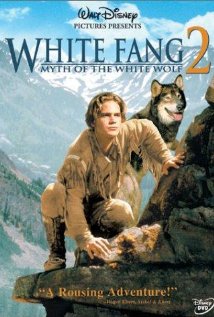
WHITE FANG 2: THE MYTH OF THE WHITE WOLF
US, 1994, 106 minutes, Colour.
Scott Bairstow, Charmaine Craig, Al Harrington, Anthony Michael Ruivivar, Victoria Racimo, Alfred Molina, Geoffrey Lewis, Ethan Hawke.
Directed by Ken Olin.
This version of Jack London’s novel is linked to the original film by introducing Ethan Hawke writing a letter to his successor, Henry Casey, played by Scott Bairstow.
The film has fine location photography, evocative of Alaska. It shows the young man and his Wolf companion, White Fang, working a mine, becoming entangled with a Reverend (Alfred Molina) who is involved in exploiting the mines of Alaska, corralling the Caribou in a hidden valley with the result that the Native Americans fell on hard times, and starving. The daughter of the chief has a dream about a Wolf and, finding Henry, assumes that he is the Wolf. Reluctantly, he becomes involved with the life of the Indians, goes on an expedition to find the Caribou and encounters dangers from the avaricious miners.
The film is benign in its presentation of the life and traditions of the Native Americans.
1. The popularity of the story of White Fang, the novels of Jack London? The settings? A young man and his dog?
2. Continuity with the original, Jack Conroy writing his letter, entrusting White Fang to Henry Casey?
3. The location photography, beauty, ruggedness? Alaska 1905? The plains, rivers, mountains? Mining? The current? The score?
4. Henry Casey, from San Francisco, friendship with Jack? Entrusted with the wolf? The bond between them? His going out to his mine, the intruder, warning him off, White Fang threatening?
5. The visit to the Indian village, the encounter with the Reverend, the confrontation?
6. Moses, Lily, Peter, the village, the Native American traditions, totems and statues, mythologies, dreams? Moses and seeing Lily finding the Wolf? Entrusting the mission to her?
7. Her travels, seeing Henry and White Fang, the rapids, her trying to help, White Fang exhausted on the shore, Henry on the mill? Rescuing him? Thinking he was the Wolf?
8. Henry, his reactions, gratitude, discussions with Moses, the discussions about him as the Wolf? The dream, finding the Caribou? His saying he was not a hunter? The details of training? Peter and the rivalry, friendship? His feelings for Lily?
9. In town, wanting credit, the shopkeeper, the riders, suspicions? The Reverend, paying for the goods? The confrontation at the Indian village?
10. The truth, blocking the entry to the Caribou Valley, the tunnels and the mining for gold?
11. The group, seeking the Caribou, the help of White Fang, the cliff, seeing the Caribou? Going into the tunnels, the dynamite, being seen, the pursuit, the shooting? The taking of Lily?
12. The pursuit of Henry, the shops, his exploding the dynamite, the Caribou getting through, the Reverend and his trying to stop them, being trampled?
13. Henry, his being at home with the Native Americans, wanting to learn their language, be with them, love for Lily?
14. Peter’s death, the mourning, Moses sending Henry on his way, Lily coming after him – and the happy ending? And White Fang finding a companion wolf, the cubs?
Published in Movie Reviews
Published in
Movie Reviews
Tagged under
Saturday, 18 September 2021 19:58
Buffalo Soldiers/ 2001
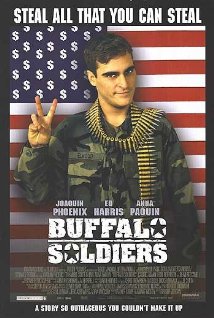
BUFFALO SOLDIERS
US, 2001, 98 minutes, Colour.
Joaquin Phoenix, Ed Harris, Scott Glenn, Anna Paquin, Elizabeth Mc Govern, Michael Peña, Leon, Gabriel Mann, Dean Stockwell.
Directed by Grigor Jordan.
Buffalo Soldiers is an acerbic satire on the American military. While there were humorous films about World War II, it was only with a film like The Americanisation of Emily, 1964, followed by M*A*S*H and Catch 22, that American audiences were really introduced to satire on what they had regarded with patriotic fervour, military action and action in war.
This film is set in 1989, the Berlin Wall about to come down, the collapse of the Soviet Empire imminent.
A group of soldiers stationed in Germany, with Joaquin Phoenix as one of those scroungers who can pick up anything, sell anything on the black market, give advice to his superiors – and get away with everything. He has some buddies, including Michael Pena, clashes with a gang of black American soldiers who threaten his enterprises. By accident, he discovers a truck full of weapons and tries to sell these to locals. A lot of the soldiers are stunned.
Ed Harris is his commander, a good but ineffectual man, married to a go-getting Elizabeth Mc Govern who is not above having an affair with her husband’s assistant. Into the camp comes a Vietnam veteran, Scott Glenn at his toughest, who challenges Phoenix who also falls in love with his daughter, Anna Paquin.
It is not long after the end of the Vietnam war and the transition that that made regarding the military, the behaviour of soldiers abroad, the attitude of the American public towards the military.
The film was directed by Grigor Jordan, Australian director of Two Hands and Ned Kelly.
1. A piece of Americana? Military? American military in the wars of the 20th century, especially Vietnam? The satiric tradition of films set in war? The Catch 22 stories, M*A*S*H?
2. Germany, 1989, the Berlin wall and its coming down? The military base at Stuttgart? Offices, buildings, the plant, accommodation, the hall for socials, the nuclear store, the courtyards, the roads in the towns, the fields? The atmospheric score?
3. The title, the military, the personnel, their attitudes and behaviour?
4. America in Russia, Eastern Europe, divided Germany? The Cold War? The American military presence in Germany, changes at the end of the 80s, the military mixing with the locals, helping the economy, the nature of the black market, commercial cleansers and re-sales, weapons, drugs, production lab, distribution? The different gangs, especially the black gang? Racial issues, the bashing of Elwood’s roommate? Inept commanders? The critique of corruption? In the aftermath of reports of military behaviour in the Vietnam War?
5. Elwood, Joaquin Phoenix, the choice of prison or the army, his criminal mind, his status in Germany, his group of friends, driving around, participating in the black market? His being an assistant to Col Berman, a sounding board for him, the yes-man, the relationship with his wife, sex? The variety of jobs, being used by the wife, preparing for the social?
6. The sales of the cleansers, the production of the drugs and the scenes in the laboratory? Getting the weapons, hesitation, storing them, going to the local Mafia and doing deals, discussions and bargaining, the exchange for drugs? Elwood and his experience, change of attitude, the threats from the local thugs?
7. Col Berman, a good man but inept, his wife and her ambitions, her affairs behind his back? His dream of buying the vineyard? Discussions with Elwood, losing his temper, apologies? Gullible signing of documents for Elwood? His wife urging him to the party, the story of the Iron Boar and his military heritage, the celebration of the party, rehearsing his words, the reaction of the General, General Marshall and the military connections, the general urging people to succeed from the ground up? His wife urging him to attack, the proposal of the defence of the plant? The trucks, thinking they were food supplies, General Marshall and his attack, the immediate defeat and surrender, Berman sitting on the Hill, removed from office, contemplating the vineyard?
8. Lee, his arrival, background, Vietnam, tough, regulations? The encounter with Elwood, permitting him to go to get things for the social? His searching Elwood’s room and finding the luxuries? Allotting a flatmate? The group shooting up the car for target practice? His daughter, Elwood, the date and his following them?
9. Lee’s daughter, her relationship with her father, living on bases, understanding him? Elwood and the attraction, fixing the battery? Seeing her dive? Her warnings, the sexual relationship, Elwood and his fear of heights, taking him to the diving board, the ultimate warnings? The and his daughter present at the social, friend of the General?
10. The absurdity of the stoned drivers of the tank, hearing the orders, smashing through everything, destroying the town, destroying the truck, the explosions? Elwood and his friends finding the trucks, the guns, their official disappearance?
11. The roommate, his background, Elwood’s offhand attitude, the man being bashed by the blacks, his gratitude to Elwood for saving him, becoming participant in the drug making, the irony of his report everything to Lee, Elwood and the betrayal?
12. The black gang, the pressures, the leader, the threats, in the nightclub, the bashing of the roommate? Wanting a percentage of the drugs, the deals, in the lab, waiting, the television with the Berlin Wall going down? The military attack, Elwood with Lee’s daughter, returning, the drug effects on the soldiers, shootings and massacres?
13. The escape, the building on fire, Elwood and the explosions, confronted by Lee, grabbing him and their both falling, Lee protecting him from dying?
14. The transfer to Hawaii, the genial and gullible commander, everything starting again?
Published in Movie Reviews
Published in
Movie Reviews
Tagged under
Saturday, 18 September 2021 19:58
New Girlfriend, The
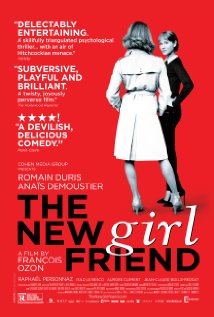
THE NEW GIRLFRIEND
France, 2014, 108 minutes, Colour.
Romain Duris, Anais Demoustier, Raphael Personnaz. Isild Le Besco, Aurore Clement.
Directed by François Ozon.
Since the 1980s, French director, Froncois Ozon has been making provocative films, especially about sexual issues and sexual ambiguity.
In this film, also with an ambiguous title, it begins with friendship between two young girls at school, its blossoming, their marriages, and one of them dying in childbirth. The other girl and her husband are entrusted with the care of the dead woman’s daughter as well as of her husband.
One day, the carer goes to visit the husband and finds him, cross-dressed, taking care of the baby. While she is shocked, she accepts his cross-dressing, his telling her that there was no need for it while his wife was alive, and then her helping him, going shopping, choosing clothes, with the make up. She is not able to tell her own husband the truth, talking about her new girlfriend, but the husband finds out, is upset but puts it down to the fact that the man is gay.
The woman becomes more and more dependent, even imagining her husband and the father in a sexual episode. At the end, the man has taken its place as a woman in society, in a relationship with his friend, their being seen collecting the daughter from school.
Ozon presents the drama and leaves it to the actors to communicate their characters and issues and for the audience to respond, all in their own way.
1. The title, meanings and ambiguity?
2. The work of the director, his interest in themes of sexuality, gender, love, commitment?
3. A French story: the two girls as children, their friendship, sharing, growing up, the blood pledge, their eyes on boys, their marriages, the developments of their life, wives and husbands all being friends?
4. The French settings, town, home, shops? Musical score?
5. Laura, David’s love for her, giving birth, her death, the pathos at the funeral, the eulogy, walking to the grave, the effect of grief on Claire and on David?
6. Claire, the relationship with her husband, her life, Laura’s will and the care for David and the child, her memories of Laura? Going to David’s home, the shock of finding him, feeding the baby, wearing the female clothes, her reaction?
7. David, his life, the dress, the bottle, his explanations, the secrets, Laura permitting this? The love, cross-dressing, not while Laura was alive? His reverting?
8. Claire and her returning, looking the wardrobe, Laura’s clothes, the dress, helping David with the make up? Going to the shops, enjoying examining the clothes, the perfumes, their both being feminine?
9. David becoming Virginie? The effect on Claire, keeping the friendship, the new girlfriend, the secrecy, enjoying the company, relationship with her husband, saying that she was going to visit her mother, forgetting to phone him, his phone call, being found out?
10. Her husband, his reaction, the truth, his comments about the femininity of David and his attitudes and behaviour, the outings, the meals, discussions?
11. The tennis game, Clare and imagining the relationship between David and her husband, in the showers, nudity and sexuality? Her fantasies? The realisation that she needed Virginie as a friend, the explanations?
12. The years passing, Claire and Virginie, the two mothers, the care for the little girl, going to the school, picking her up, happy? Pregnant?
13. Issues of gender, orientation, behaviour, cross-dressing, becoming a character? Bonds between friends, sexual attraction? The long-term effects?
Published in Movie Reviews
Published in
Movie Reviews
Tagged under
Saturday, 18 September 2021 19:58
Sleepy Hollow
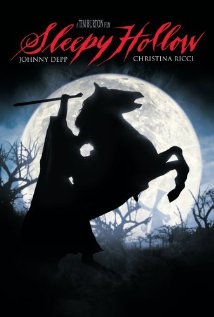
SLEEPY HOLLOW
US, 1999. 105 minutes, Colour.
Johnny Depp, Christina Ricci Miranda Richardson, Michael Gambon, Casper Van Dien, Jeffrey Jones, Richard Griffiths, Ian Mc Diarmid, Michael Gough, Christopher Walken, Marc Pickering Lisa Marie, Steven Waddington, Claire Skinner, Christopher Lee, Alun Armstrong, Martin Landau.
Directed by Tim Burton.
Sleepy Hollow is a version of Washington Irving’s story, The Legend of Sleep be Hollow (filmed by Disney, 1949, as part of Ichabod and Mr Toad).
This version is very much a Tim Burton film, a sense of the mysterious, special effects that are both gory and with the touch of humour, and exercise in American history, American superstition, American horror.
Johnny Depp, who worked with Burton in Edward Scissorhands, Ed Wood, Sweeney Todd, Alice’s Adventures in Wonderland, is the rather straightlaced rationalist detective from New York City who is sent to investigate a series of murders in upper New York State, in Sleepy Hollow. He does not believe in ghosts but soon experiences the Headless Horseman, is terrified, and changes his approach. He is helped by the daughter of the powerful man of the town, Michael Gambon, Katrina (Christina Ricci).She, however, does believe in potions and spells – as does her mother, played by Miranda Richardson.
Christopher Walken has quite some moments when the Headless Horseman has a head, fierce in battle, sharp teeth, wielding a sword and decapitating. The film was made in England and quite a number of British character actors have good roles including Richard Griffiths, Michael Gough, Ian Mc Diarmid, Christopher Lee, Alun Armstrong.
The film has a great deal of atmosphere, the presentation of the 18th century village, the eerie woods surrounding the village, the attacks of the Horseman, the visualising of the decapitations, a mysterious tree in which heads buried and blood flows, a mysterious witch.
While Ichabod Crane has to change his perspective from complete 18th century rationalism, he still uses police work and detection to solve the mystery of the killings.
One of Tim Burton’s films which will be singled out as most characteristic.
1. Washington Irving’s classic story? History and legend? 18th century, 19 century?
2. Tim Burton, his stories, treatment, horror, mystery, comic touches? The musical score by Danny Elfman?
3. New York, 1999, the dead body in the river, the police, the courts, the Superintendent and his manner, the apprehension of the thief and throwing him into the cellar, the magistrate is president court, the appeals, reason? Sending Ichabod Crane to Sleepy Hollow?
4. Johnny Depp as Ichabod, age, personalities, serious, the constable, his experience, police work, science, his created equipment, books, in court, going to Sleepy Hollow, his hopes?
5. Sleepy Hollow, in the vistas of the town, in the house, doctors rooms, the streets? 18th century?
6. The woods, the beautiful, eeire, the paths, the trees? The deadly and twisted tree?
7. The opening, Van Garrett, his son, the will, the seal, the pursuit of the headless horsemen, the fears, the decapitations?
8. The history of the headless horseman? Appearance, face, teeth, bloodthirsty in battle, the beheadings, his own death? The little girls watching? Burying his body, the removal of his head, his continued search for its, his vengeance? His list of victims? The pursuit of Ichabod? The tone, superstitions? And the fear in the town?
9. The village, the problems, the leaders, the stories, the conspiracies, witchcraft, Lady Van Tassel, Katrina?
10. The introduction to the village, the inn, Boltus, Katrina, the celebration, her kissing Ichabod, the jealousy of Brum, the notary, the magistrate, the Reverend, the doctor, talk and explanations? The deaths? The death of the widow? The servant?
11. Phillips, confiding in Ichabod, his knowledge, his fears, the pursuit by the horseman, decapitation, his head in Ichabod’s lap, the horseman using his sword to retrieve it?
12. The young boy, his father as the servant, his wanting to help Ichabod, the death of his father? Ichabod accepting his help?
13. Ichabod, visiting the crone, her behaviour, the special effects – and later hearing that her sister killed her?
14. Ichabod and his seeing the horseman, in action, fainting, his previous scepticism, his books, Katrina giving him the book of spells?
15. The notary, his fear, in himself? The Reverend, the sexual encounter with Lady Van Tassell? The doctor and his affair with the maid? The truth about the elders and their complicity?
16. Ichabod, finding the documents, their pointing to Boltus, yet his death? The issue of who would benefit most from the deaths? Lady Van Tassell?
17. The mother, Katrina, the threats? Her rendezvous in the woods with the Reverend? Her seeming death, her being live, using the maid as a substitute?
18. Her motivations, explanation of her story, the two little sisters, the family in poverty, ousted by the Van Garrett’s, her playing, revenge, came the wealth, the use of witchcraft?
19. Ichabod, going to the tree, the discovery of the fence, the blood from the tree? The horseman, the fight with Ichabod, Ichabod shot, the book of spells stopping the bullet? Ichabod giving the head to the horseman, his restoration, his vengeance, the death of Lady Van Tassell?
20. Peace being restored? Ichabod and Katrina going to New York?
21. The story of superstitions and the age of reason?
Published in Movie Reviews
Published in
Movie Reviews
Tagged under